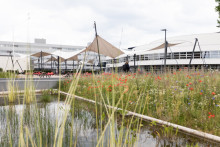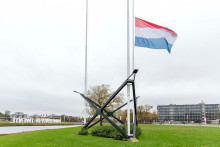Sheila Jasanoff is a professor in science and technology at the John F. Kennedy School of Government at Harvard University in Cambridge, Massachusetts. She also teaches at the Harvard School of Public Health and the Department of the History of Science.
Her research focuses on the question of how science and technology provide challenges for law and politics in democratic societies and how new 'social orders' are formed.
Honourary promotor and emeritus professor philosophy of science and technology (faculty of Behavioural Sciences) Arie Rip calls Jasanoff a sharp analyst, partly because of her legal background. 'She is known as one of the central figures in Science, Technology and Policy studies', he says.
According to Rip, Jasanoff is 'extremely honored with this degree which she sees as absolute recognition for her work.'
Sung Wang Kim (b. 1940), professor-for-life at the University of Utah in Salt Lake City, is an excellent scientist who has also meant a lot for the University of Twente, says professor Feijen, scientific director of the Biomedical Technological Institute (BMTI). He put his friend and collegue forward for the degree.
Sung Wang Kim is famous for his research on drug delivery using degradable polymers. 'The last ten years he specialised mostly in gene delivery', says Feijen.
Kim received a lot of prizes for his work, but this is his first honorary doctorate. Feijen: 'He was very honored and will certainly come to the ceremony. Fantastic that it worked out like this.'
Gerard Holzmann is the founder of the SPIN model checker, the Swiss army knife of the computer world. To produce software without bugs it is necessary to verify it. The most significant method is model checking: the automatic searching for a model matching the given properties. Because software models are exceptionally large, they require ingenious algorithms to make them receptive to automatic searching.
Gerard Holzmann made model checking what it is today: a practical, automatic technique for software analysis called SPIN. The secret of Holzmann's succes is that he, as the designer, is in the middle of the users of SPIN and knows of their needs. He is a partisan of the theory which he further develops and broadens. He is also an engineer who isn't scared of experimenting with new concepts - for which there is no theory yet. This mixture of research and practical technology makes Holzmann an ideal candidate for an honourary doctorate, according to his honourary promotor Ed Brinksma (part-time professor at the EWI faculty and director of the embedded systems institure at the technical university of Eindhoven.)
James Fraser Stoddart, born in Scotland in 1942, is an innovative scientist in the field of nano-technology. He was put forward by UT-professor David Reinhoudt. Stoddart is co-director of the California NanoSystems Institute (CNSI). He is one of the few chemisists of the last 25 years who created a new field in organic chemistry. Honourary promotor and scientific director of MESA+ David Reinhoudt: 'Stoddart developed the supramolecular chemistry into a practical application. He develops a creative line in research on non-existent knowledge and generates new knowledge which he doesn't use. He leaves that to the spin-offs. He is a real scientist in that sense.'
Stoddart is a member of the scientific board of advice of MESA+ and foreign member of the Royal Dutch Academy of Sciences, department of Physics.







